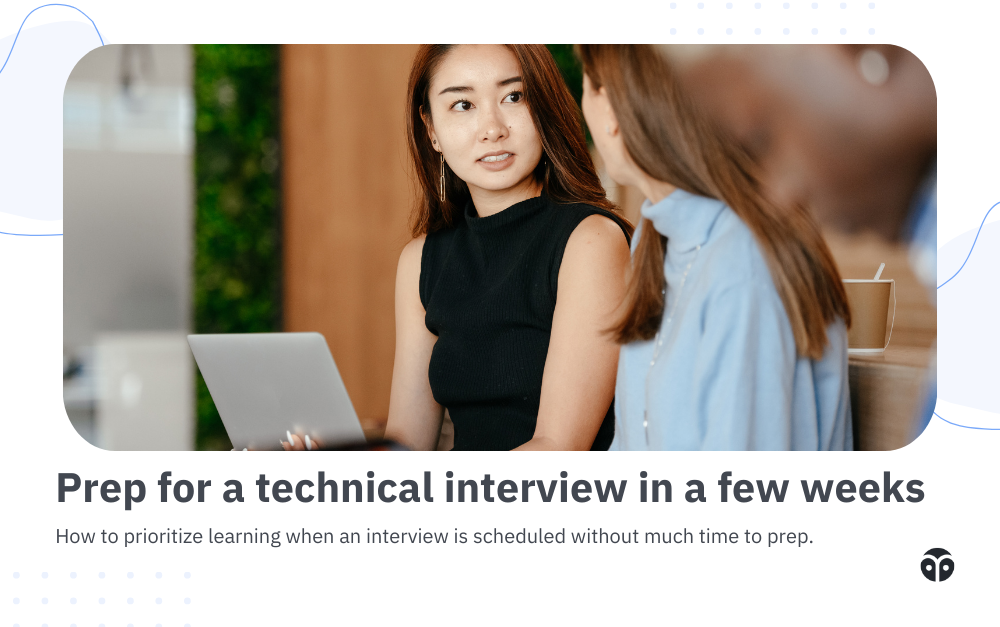How to prepare for a technical interview in just a few weeks
How to prep for a technical interview when you only have a few weeks.

When you’re crunched for time to prepare for a technical interview, it’s easy to feel overwhelmed. You might wonder how to make the best use of your time or which areas to focus on to increase your chances of success.
Rather than just grinding through random problems, you need a structured plan to make sure you’re focusing on the right things at the right time.
Here’s a 5-step guide for how to prepare for your technical interview when time is limited.
1. Benchmark + Plan = Success
The first step is to figure out where you stand. Without a clear understanding of your strengths and weaknesses, you risk wasting precious time on areas you’ve already mastered — or missing the ones that need the most work.
Here’s how to start:
- Identify your weak areas early through an initial assessment.
- Focus on the gaps in your knowledge.
- Set clear targets for your practice.
- Rely on quick feedback loops to make sure that you’re progressing in all the right areas.
2. Be strategic with your practice
When you’re pressed for time, every practice session needs to have a clear purpose. Instead of aimlessly solving random coding problems, focus on the types of problems you're likely to encounter in the interview. This doesn’t mean memorizing specific questions — companies rotate problems to avoid that. Instead, build your problem-solving toolkit by focusing on key strategies:
- Target the critical problem areas that you identified
- Use diverse learning methods: solo coding, pair programming, and peer group sessions all provide unique benefits.
- Practice explaining your thought process as you solve problems — this is as important as finding the correct answer.
At Formation, we emphasize this multi-method approach because it mimics real-world scenarios.
3. Save mock interviews for the final stage
Mock interviews can be a great tool for evaluation, but they’re not always the most effective use of time early in your prep. Early on, focus on learning and reinforcing your fundamentals. Then, once you’ve built up your technical skills, use mock interviews to see how well you perform under pressure.
Here’s when to use mock interviews:
- As a final check after building a strong foundation.
- To test your communication skills under interview-like conditions.
- To simulate the real interview experience and manage nerves.
During these final mock interviews, you’re testing your ability to communicate your solution, stay calm under pressure, and manage your time effectively — all critical components of a technical interview.
If you're looking for a structured way to combine technical skill-building with interview practice, Formation's approach ensures you maximize your learning by targeting your weak areas early, and our mock interviews provide an authentic way to evaluate yourself by simulating the real interview experience when you’re ready.
4. Don’t miss out: The power of group sessions
One thing candidates often overlook when prepping for interviews is the power of group sessions. Explaining your thought process to others forces you to refine your understanding of concepts. Plus, it gives you a chance to hear how other people approach the same problem, which can broaden your perspective.
Why group sessions work:
- Learn by teaching. Explaining your approach to others solidifies your understanding.
- Gain new perspectives. Seeing how peers tackle the same problem broadens your problem-solving strategies.
- Practice communication skills. Technical interviews are as much about how you communicate as what you know.
At Formation, we focus heavily on group practice because it mirrors the collaborative nature of real-world coding environments. It’s a win-win: you improve your technical skills while simultaneously practicing how to communicate under pressure—something that’s essential for technical interviews.
5. Prioritize your time wisely
In a condensed timeframe, you need to constantly assess how you're spending your time. If you're getting stuck on a problem, don’t waste hours spinning your wheels. Identify the issue, ask for help, or switch to a different topic. The key is to keep making progress.
Tips for staying on track:
- Don’t spend too long on one problem. If you’re stuck, switch or ask for help.
- Keep assessing your progress. If you're not improving in an area, reassess your approach.
- Use mentors and peers to help guide your preparation and give targeted feedback.
A structured support system can make all the difference. Whether it’s a mentor, a peer group, or a program like Formation, having people to guide you ensures you’re spending your time where it counts most.
Work smarter, not harder
When you're short on time, it’s not about how much you practice; it’s about practicing the right things. Benchmark early, target your weaknesses and be intentional with your practice. Don’t just grind through endless problems. Focus on understanding the fundamentals and refining your communication skills in a collaborative setting.
If you’re looking for a way to streamline your preparation, Formation provides a personalized approach designed to maximize your results. Every hour of practice counts when you have the right strategy in place.



